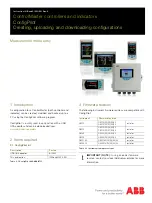
Mercury 2 FPGA Module
Reference Manual
www.micro-nova.com
v1.0 August 2, 2019
© 2019 MicroNova LLC
1 of 9
OVERVIEW
Mercury 2
is an ultra-compact
3” x 1”
Xilinx Artix-7
FPGA development board. The convenient 64-pin
DIP form-factor makes it easy to add an FPGA to a
breadboard, protoboard, or to your own custom PCB
design. The
Mercury 2
module provides a complete
FPGA solution, encapsulating all the required power,
configuration, and I/O circuitry, leaving you to focus
on your project.
Unlike most FPGA development boards,
Mercury 2
is
equipped with 5V tolerance on 40 digital I/O pins, so
FPGA logic can be safely and easily interfaced with
5V logic level devices. The
Mercury 2
board also
supports a wide range of analog I/O, including an
8-channel SPI ADC with external VREF up to 5V,
a 2-channel SPI DAC, and the 1-MSPS Xilinx XADC.
An external 4Mbit SRAM provides a high-speed
buffer for data acquisition and signal processing.
Mercury 2
has a 32 Mb SPI flash to hold the FPGA
bitstream and user data. The board has a micro USB
port for easy programming and user data transfer.
The board is also equipped with a 10/100 Ethernet
PHY for network connectivity.
The complete schematics for
Mercury 2
are
available on our website, along with open-source
USB programmer apps for Windows and Linux, and
several example projects, and reference designs.
SPECIFICATIONS
➢
Xilinx Artix-7 FPGA (XC7A35T-1FTG256C)
▪
33,280 logic cells
▪
1,800 Kbits internal block RAM
▪
90 DSP slices (DSP48E1 48-bit ALUs)
▪
5 clock management tiles (CMT)
➢
FTDI FT2232H dual-channel 480Mbps
USB 2.0 interface with Micro-USB port
▪
Channel A: FPGA configuration and debug
▪
Channel B: user-configurable interface
for high-speed data transfer
➢
32 Mbit SPI flash
(up to 16.7 Mbit used for
FPGA bitstream, remainder for user data)
➢
4 Mbit SRAM
(512 K x 8 bit) with
fast, asynchronous 10 ns interface
➢
50MHz MEMS oscillator
(±50 ppm)
➢
Digital input/output
▪
40x 5V tolerant digital I/O pins
(SN74CB3T)
▪
10x FPGA-direct I/O pins
▪
3x user LEDs
➢
Analog input/output
▪
8-channel, 200 KSPS 10-bit ADC
(MCP3008)
▪
2-channel, 220 KSPS 10-bit DAC
(MCP4812)
▪
1 MSPS 12-bit Xilinx XADC module
(1x direct input and 3x AUX inputs)
➢
Network communications
▪
10/100 Ethernet PHY
(Microchip LAN8720A)
for use with Ethernet jack breakout board
▪
Expansion header
(1x8 pin, 0.05”)
intended
for use with the ESP-11 Wi-Fi module
Figure 1:
Mercury 2 FPGA Module



























